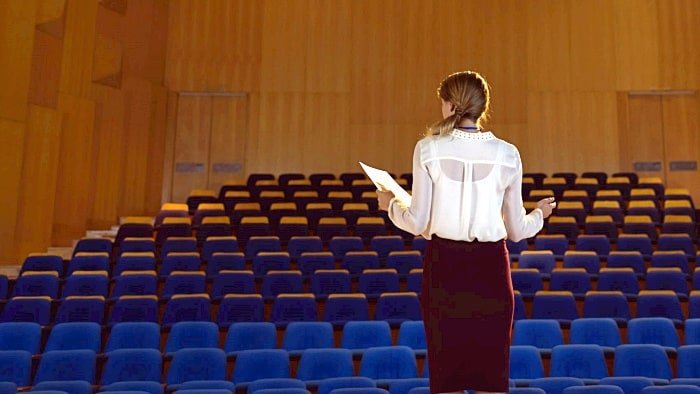Pronunciation
Phonology and intonation
10% |
Native/Near-native phonology and intonation. |
Good phonology and intonation, free from mother language interference. Few errors. |
Phonology and intonation influenced by mother language, but understandable. |
Mother tongue phonology and intonation. Numerous errors. |
Very difficult to understand. |
Technical Vocabulary
10% |
Excellent use of technical vocabulary. |
Good use of technical vocabulary. |
Correct use of some technical vocabulary. |
Basic words or incorrect pronunciation/use of technical vocabulary. |
No use of technical vocabulary. |
Grammar/Syntax
10% |
Excellent control of language features. Uses a wide range of well-chosen vocabulary, and accurate and varied grammatical structures. |
Good language control. Good range of relatively well-chosen vocabulary. Minor problems in usage do not distort meaning or inhibit communication. |
Adequate language control. Vocabulary range is a bit lacking or some grammatical errors that do not obscure meaning. Little variety in structures. |
Weak language control. Vocabulary used does not always match the task. |
Numerous errors and incorrect use of simple structures. |
Voice
Fluidity, tone, speed
10% |
Smooth and fluid presentation, with a lively pace in a perfect tone. |
Speech is relatively smooth, correct rhythm and tone. |
Some hesitation made the presentation longer than needed. Pausing may cause confusion. |
Too many breaks and errr...errr, except for short memorized phrases. |
Monotonous presentation in a low voice or with too many hesitations. |
Pedagogy
How was the message conveyed?
10% |
Very entertaining and clear message. The audience enjoyed the talk and learnt something new. |
The message was well explained and fairly clear. |
The message was more or less clear, but the speech needs some improving. |
The explanation was not very clear because the candidate did not seem to master the topic. |
The message was not clear at all, and the explanation was difficult to follow. |
Freedom from notes
Independence from written support
10% |
Fluid speech. Hand-free presentation with no use of notes. |
Notes were used as a guide but not read. |
Some text fragments were read from notes/text. |
Mostly reading from notes/text, which affected body language and interaction with colleagues, audience and visual support. |
The candidate read everything from notes/text. This led to awkward body language and no eye contact. |
Body language
Extralinguistic abilities
10% |
Active, engaging, good use of hands, eye contact, smile. |
Comfortable, pleasant, very good to watch. |
Correct, but lacking to engage with camera. Needs to improve on eye contact/ use of hands/ posture. |
Displays minimal eye contact with camera, while reading mostly from notes. Speaks in uneven volume with little or no inflection. |
No eye contact with camera, as entire report is read from notes. Speaks in low volume and/or monotonous tone, which causes viewers to disengage |
Structure
Organisation
10% |
The speech followed a linear, organised plan, very easy to follow by the examiner. Excellent introduction, development of main points and conclusion. |
The speech followed a fairly organised plan, but sometimes the explanation went back and forth. |
The speech did not follow a clear plan. The candidate went round in circles to explain the topic. |
The speech was rather disorganised, which made it difficult for the examiner to follow. |
The speech was a collection of disconnected sentences. |
Science
Scientific content
10% |
Excellent technical presentation that consists of a scientific topic and solid scientific support. |
Technical presentation that makes explicit use of some scientific support. |
The presentation is slightlty informal. Scientific literature is referenced but only superficially. |
No clear connection with a scientific topic or the sources are not explicitly referenced. |
The presentation lacks scientific content. It makes no reference to scientific literature. |
Video
Technical quality
10% |
The team submitted a single video, which has been edited and shows clear transitions and interaction between members. |
The team submitted a single video, with some editing but no interaction between members. |
The team submitted a single video, which is a collection of individual recordings, with no editing or interaction between members. |
Individual videos that make some reference to one another, but establishing a connection between them is not straightforward. |
The team submitted one independent video per member, without clear connection between them. |
